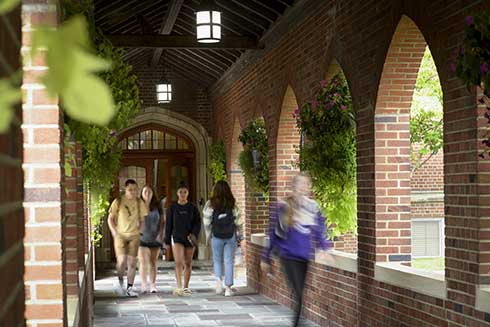Nazareth University expands commitment to students’ mental health and wellness with federal grant
As critical mental health needs continue to increase among students nationwide, Nazareth University sought and received a $300,000, three-year federal grant to expand its commitment to support students’ mental health and wellness and enhance suicide prevention with hiring and extensive training. Nazareth will use the grant to launch its Mental Health Awareness Across Campus project in fall 2023, and it is one of only 22 colleges and universities nationwide to be awarded a U.S. Department of Health and Human Services’ Substance Abuse and Mental Health Services Administration grant.
Mental health isn’t just a health and counseling concern, but a priority for the whole campus, said John Rigney, assistant director of wellness outreach and education. “We want to train everyone on campus on how to support students, and this grant will help us do that. It’s called gatekeeper training — we are arming faculty, staff, and coaches with the tools to recognize a student who is struggling and know how to support and refer them. The goal is to create a culture of well-being that is embedded throughout the Nazareth campus community.”
Recent studies found that nearly 80% of higher education faculty nationwide report dealing with students’ mental health issues, but relatively few have received training and only about half say they can recognize a student in distress. The grant and initiative will help Nazareth increase training to faculty and staff so they can help students.
“Student-centricity is at the core of what we do at Nazareth, and we have worked to create interdisciplinary teams and initiatives to prioritize and promote student wellness, mental health, and safety," said Kim Harvey, associate vice president for student and campus life and dean of students.
The grant helps Nazareth fund a four-year program as a JED Campus, a nationally-recognized higher education program from the Jed Foundation (known as JED) that protects emotional health and prevents suicide for teens and young adults. Phil and Donna Satow started the organization in 2000 after their youngest son, Jed, died by suicide in college in 1998. JED will help Nazareth develop a customized strategic plan to build on existing strengths, and implement strategies that lead to improvements in mental health and a more connected community.
Other key initiatives Nazareth is implementing:
- Hiring an alcohol and other drugs (AOD) and suicide prevention coordinator.
- Increasing the Nazareth community’s ability to recognize, respond to, and refer students who are struggling with mental health issues such as substance use, self-harm, and suicidal ideation by providing mental health and alcohol and other drugs training to 130 faculty/staff and 318 students, as well as training key staff to train the campus community.
- Making Narcan and fentanyl test strips available.
With the federal grant giving a strong boost to Nazareth’s already robust mental health resources, the University is launching the Well-Being Collective this fall. The collective is a comprehensive approach that embeds health into all campus policies and generates a thriving community and a culture of well-being.
“We’ve brought people from all areas of campus to work on messaging, setting goals, and really coming together to build a holistic, equitable community that nurtures all dimensions of wellness,” said Harvey. “It allows us to see where we may have gaps in our outreach, and we can make sure we can meet the needs of our students.”
The Well-Being Collective allows students to build a strong foundation to keep their mental health and wellness a priority. A seven-step approach can guide students as they practice self-care, build their community, and develop their skills to maintain or improve their health, while knowing how to ask for help from Nazareth experts.
Nazareth’s already strong commitment to mental health is noticed by current students. “Emotional well-being is important,” said Nazareth student Abby Nash ’25, a biology major. “It’s nice to have counselors and mental health groups on campus that make you feel like you’re not alone, and someone to support you every step of the way.”
Other students say the increased training for the whole campus can improve the culture even more. “It is important we focus on mental health because it allows our students to understand they are not alone, said Nazareth psychology major Makayla Porzio ‘27. “It also educates our staff, and students so they may gain empathy for those around them.
Contact
Julie Long | Senior News & PR Officer | jlong2@naz.edu | (585) 389-2456 | (585) 781-8186 (cell)
Nazareth University is an inclusive community of inspired learners, educators, and changemakers who for 100 years have been driven by a bold commitment to action, empathy, equity, and leading innovation for the common good. Impact experiences are at the heart of a Nazareth education, preparing each student to discover within themselves the potential to cultivate positive change in their life's work, in any career field, and in a world that is constantly evolving and infinitely interconnected.
Our broad academic offerings present a range of study options typical of larger universities, yet achieved in our supportive campus culture. Nearly 2,100 undergrad and 600 graduate students enroll in degree and certificate programs and engage in collaborative, transformative learning experiences, preparing for the professions and society of today and tomorrow. In a learning community that purposefully integrates liberal arts and professional programs, Nazareth University graduates are able to launch a lifetime of impactful leadership in communities and workplaces near and far.
